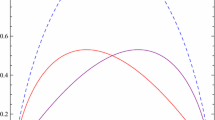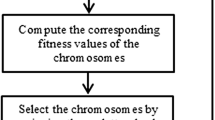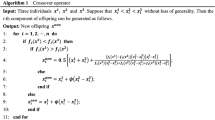Abstract
This paper develops a λ mean-hybrid entropy model to deal with portfolio selection problem with both random uncertainty and fuzzy uncertainty. Solving this model provides the investor a tradeoff frontier between security return and risk. We model the security return as a triangular fuzzy random variable, where the investor’s individual preference is reflected by the pessimistic-optimistic parameter λ. We measure the security risk using the hybrid entropy in this model. Algorithm is developed to solve this bi-objective portfolio selection model. Beside, a numerical example is also presented to illustrate this approach.
Similar content being viewed by others
References
Abdelaziz, F. B., Aouni, B., & El Fayedh, R. (2007). Multi-objective stochastic programming for portfolio selection. European Journal of Operational Research, 177, 1811–1823.
Arenas Parra, M., Bilbao Terol, A., & Rodriguez Uria, M. V. (2001). A fuzzy goal programming approach to portfolio selection. European Journal of Operational Research, 133, 287–297.
Campos, L. M., & Gonzalez, A. (1989). A subjective approach for ranking fuzzy numbers. Fuzzy Sets and Systems, 29, 143–153.
Chankong, V., & Haimes, Y. Y. (1983). Multi-objective decision making: theory and methodology. New York: North-Holland.
Chen, L., & Huang, L. (2009). Portfolio optimization of equity mutual funds with fuzzy return rates and risks. Expert Systems with Applications, 36(2), 3720–3727.
Gil, M. A., & Lopez-Diaz, M. (1998). The λ-average value and the fuzzy expectation of a fuzzy random variable. Fuzzy Sets and Systems, 99, 347–352.
Hu, Y. (2005). Operations research. Beijing: Tsinghua Publisher (in Chinese).
Huang, X. (2008). Risk curve and fuzzy portfolio selection. Computers and Mathematics with Applications, 55, 1102–1112.
Inuiguchi, M., & Ramik, J. (2000). Possibilistic linear programming: A brief review of fuzzy mathematical programming and a comparison with stochastic programming in portfolio selection problem. Fuzzy Sets and Systems, 111, 3–28.
Inuiguchi, M., & Tanino, T. (2000). Portfolio selection under independent possibilistic information. Fuzzy Sets and Systems, 115, 83–92.
Katagiri, H., & Ishii, H. (1999). Fuzzy portfolio selection problem. In Systems, Man, and Cybernetics, 1999. IEEE SMC’99 Conference Proceedings (Vol. 3, pp. 973–978).
Li, H., He, D., & Li, X. (2003). Entropy-A new measurement for the risk of the security portfolio. Practice and Understanding of Mathematics 3, 3(6), 16–21 (in Chinese).
Markowitz, H. (1952). Portfolio selection. Journal of Finance, 7, 77–91.
Philipatos, G. C., & Wilson, C. J. (1972). Entropy, market risk, and the selection of efficient portfolios. Applied Economics, 4, 209–220.
Puri, M. L., & Ralescu, D. A. (1986). Fuzzy random variables. Journal Mathematics Analysis and Applications, 114, 409–422.
Ramaswamy, S. (1998). Portfolio selection using fuzzy decision theory. Working paper of Bank for International Settlements, No. 59.
Roy, A. D. (1952). Safety-first and the holding of assets. Econometrics, 20, 431–449.
Shang, X., & Jiang, W. (1999). Comments on hybrid entropies. Control Theory and Applications, 16(1), 84–86 (in Chinese).
Simonelli, M. R. (2005). Indeterminacy in portfolio selection. European Journal of Operational Research, 163, 170–176.
Smimou, K., Bector, C. R., & Jacoby, G. (2007). A subjective assessment of approximate probabilities with a portfolio application. Research in International Business and Finance, 21, 134–160.
Soyer, R., & Tanyeri, K. (2006). Bayesian portfolio selection with multi-variate random variance models. European Journal of Operational Research, 171, 977–990.
Tanaka, H., Guo, P., & Turksen, I. B. (2000). Portfolio selection based on fuzzy probabilities and possibility distributions. Fuzzy Sets and Systems, 111, 387–397.
Tiryaki, F., & Ahlatcioglu, M. (2005). Fuzzy stock selection using a new fuzzy ranking and weighting algorithm. Applied Mathematics and Computation, 170, 144–157.
Watada, J. (2001). Fuzzy portfolio model for decision making in investment. In Y. Yoshida (Ed.), Dynamical aspects in fuzzy decision making (pp. 141–162). Physica-Verlag: Heidelberg.
Wu, D. (2009a). Supplier selection in a fuzzy group setting: a method using grey related analysis and Dempster–Shafer theory. Expert Systems with Applications, 36(5), 8892–8899.
Wu, D. (2009b). Performance evaluation: an integrated method using data envelopment analysis and fuzzy preference relations. European Journal of Operational Research, 194(1), 227–235.
Wu, D., & Olson, D. L. (2008). A comparison of stochastic dominance and stochastic DEA for vendor evaluation. International Journal of Production Research, 46(8), 2313–2327.
Xie, S., Li, Z., & Wang, S. (2007). Continuous-time portfolio selection with liability: Mean–variance model and stochastic LQ approach. Insurance: Mathematics and Economics.
Yang, J., & Qiu, W. (2004). A measure of risk and a decision-making model based on expected utility and entropy. European Journal of Operational Research, 164, 792–799.
Author information
Authors and Affiliations
Corresponding author
Rights and permissions
About this article
Cite this article
Xu, J., Zhou, X. & Wu, D.D. Portfolio selection using λ mean and hybrid entropy. Ann Oper Res 185, 213–229 (2011). https://doi.org/10.1007/s10479-009-0550-3
Published:
Issue Date:
DOI: https://doi.org/10.1007/s10479-009-0550-3




